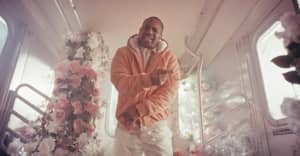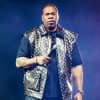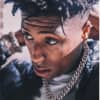“This is the first time I’m seeing this on a big screen!” Swizz Beatz exclaimed on his recent visit to The FADER offices. The artist, entrepreneur, and art collector just dropped the video for “Pistol On My Side (P.O.M.S),” the Lil Wayne-featuring lead single for his upcoming album Poison, and wanted to watch it on our conference room television. The video shows Wayne comfortably in his element, rapping and skating around his flaming skateboarding haven; as a whole, it's indicative of Swizz’s overall ethos for Poison: creating environments where artists can fully be themselves over Swizz’s production.
Swizz also played us a lengthy preview of the album, a thoughtfully sequenced collection of cinematic tracks featuring artists like Pusha T, Giggs, and Young Thug, with executive production from J. Cole. The album's intention was to be rooted in hip-hop that valued quality above all else, and it's the first in a series of four albums occupying their own genre-specific lane as well. After sharing his latest work, and just ahead of his curated auction for Sotheby's, he talked to us about how his new album came to be and collaborating with J. Cole, his arts ventures, and what's next for him.
You just celebrated your 40th birthday. What are your goals in this new chapter in life?
To outperform my previous chapter. I don’t compare myself to other people — I’m my own opponent. My new self is better than my old self, and I have to feel that way to raise the ceiling to the place I want to be. I love challenging myself, which is the reason I didn’t take the easy way out with my record. I could have had a whole different record, but for what? Everything that I’d be going to get I have, so let me go and get something that will add to something at a time I feel it’s needed.
I feel like real lyrics and music are needed. I’m not against other artists having fun and doing what they do, but as far as me having the experience and longevity that I have, what am I bringing to the table in 2018? That’s why I keep saying “quality” — I don’t feel like there’s enough quality out there. There’s a lot of quantity. Many people might feel like they’re giving quality, and I can’t knock them because people might have felt like I wasn’t doing quality when I was 17.
You just got back from Egypt. What was that like?
I’ve been a fan of Africa, period. The knowledge that I gained in Kemet and Egypt was timeless. It solved a lot of things I’d been wondering about: why, as a culture, we’re attacked so much. The bottom line is that there’s no one like the culture [or] our people. People did everything to make that go away, and even today it’s still happening — and it connects back to thousands of years ago. People tell me I’m very skeptical, but seeing things written in stone is a different vibe. We had an amazing teacher that brought us on this trip who taught us how to read hieroglyphics. We were out there for two weeks and were everywhere. A lot of things happened and started there.
Last year you introduced Burna Boy at his first New York show. Around the same time, you were posting a bunch of videos of you listening to African pop on social media. What got you into the subgenre?
I’ve been into African music since Fela Kuti. I listen to all music — I just felt comfortable to display it, because sometimes I don’t wanna give up everything I’m listening to. Bbefore Instagram, I was posting some Fela music, and people would be like, “C’mon Swizz, you’re from the Bronx, why are you listening to African music?” Now, Wizkid can come over here and sell out a show. I tell people, Don’t be afraid of something that’s not happening yet. If you love it, embrace what’s not happening yet, because it might happen tomorrow. When I heard Burna Boy, no one knew him over here like that and I’d been rocking with him for a minute. He asked me to intro him in New York for the first time. He’s really talented.
A few years ago, you invested in K-pop in an infrastructural way. Do you have intentions to do that with African pop?
I do, but I can invest in it in a non-investing way. Investing in it is like when I went to South Africa recently and dealt with all of the artists there with Black Coffee and gave out beats. Ricki Rick from South Africa, his album dropped yesterday. His first single is an homage to me, which I didn’t know. He called me and wrote me a long letter of how he was inspired — how, when I went there, it was an explosion of joy. I couldn’t believe no artist from the States had ever went in the crowd with the people and vibed with them. I didn't know doing that was so different until they started singing the national anthem to me on stage. I was like, "This shit just got real." My investment is to embrace the artists and creativity that I love. If I can help them, I will — but I'm not going to start an afrobeats label or anything.
I read an interview where you talked about bringing equity and residual income to visual artists. On your Instagram, you posted a caption saying that was an important issue you intended to solve. How did this come to your attention, and how are you working towards solving it?
Being an art collector for twenty years, and now having a big stake in the market as far as African American and African art — for example, the big Kerry James Marshall painting that sold with Sean Combs, the entrepreneur. Imagine if he'd been able to get royalties on that sale as a living artist. There's going to be some changes happening, and I'm working towards that. I've got a Sotheby's show on September 20, and all of these things are leading to create communication and a relationship with the auction houses and artists. I was telling the artists, I wouldn't be able to buy your art if I didn't have residual income coming in since I was 17. Once an artist's work is gone, it's gone — but I can go to iTunes right now and play my music.
You recently graduated from Harvard’s OPM program. How did your experience there influence your thinking and approach to business?
The program changed my life because it gave me structure. Most creatives don't understand the business, which is why we're still talking about artists getting royalties in 2018. But if we had more [business] educated artists understanding beyond the craft, the institutions would have a harder time with them settling for anything. I'm an artist and have to talk to five people to get to fairness [on the business side]. It was a one-week elective course, Launching New Ventures gave me all of those tools. I built No Commission from school, which is how I was able to figure out how to get artists 100% of their sales, and still produce a show and maintain ownership of the company.
How did your arts venture No Commission first come about? Was it a thesis project or something you were already working on?
I was curating a lot of big shows during Art Basel, and I was able to see the infrastructure [of this industry]. The gallery wins, the fair wins, the collector wins, and the artist has to find their way home. I was taking care of so many artists that had sold-out shows. I decided that, one day, I wanted to make a show where the money went 100% to the artist. We've given back millions already.
How did J Cole come into the executive producer role on your album?
He played the role of young mentor to me. I'm not too cool where I can't have a young mentor, being as I'm a young OG. We were playing each other music, and then we started talking about things other than our projects, books, different things. One time, I was playing him songs from the album — before I had all these different sonic elements to the album, before separating them into four boxes. What I played you guys, where it stopped, he was like, "That's the record. The other records you're playing me, they're huge, but I don't think you need it." And I'm like, "Are you crazy?"
I was caught up in the wrong things, and even though I would feel it wasn't the right time when I was playing those other records, it didn't matter because I was coming back. He assured me I didn't have to do that. Even with not shooting expensive videos: they're well done, and I came up with the concept of no treatments, up-close-and-personal, with the artists in their elements. I ran that past him, and he was like, "Yes!" Why shouldn't he get that credit when he brought so many gems to the table? My generation needs to learn how to get along with the new generation anyways.
This is the first album in a series.
Yes, one of four. This is all authentic — what I feel, hip-hop. The next one is going to be R&B. See how Poison is curated? Everything is going to be curated like that. Beauty and the Beats, Return of the Showtime, Global Mindset — with all the international artists, I want everything to feel seamless and flow into each other like conversations.
The Young Thug song on the album is so crazy! How did it happen?
It came from me wanting to give him tracks. He recorded five songs that day, and then we had a conversation about his brother who's lyrical, like a Rakim. [Thug] was telling me how much he loved rap, like rapping-rapping, and lyrics — but in his field, he's in a different era where he's gotta do his thing. I felt like my album was a good place for him to flex a skill that might not be comfortable to his core audience, but would be respected [here]. I was playing him the Nas verse and getting him in a lyrical mood, and I pulled up this beat that was for DMX, and was like "I would like to hear you on something like this." And he was like, "Turn the mic on." He went in there and did that song in one take. I let every artist have their freedom on this record.
I had a hard time connecting — like, how am I going to get back in the game and vibe with artists I don't vibe with lyrically? I figured it out. Talk to them, produce them, take them out of their comfort zone — that's how you get the Thug record.
Thumbnail image via Swizz Beatz's Instagram.


